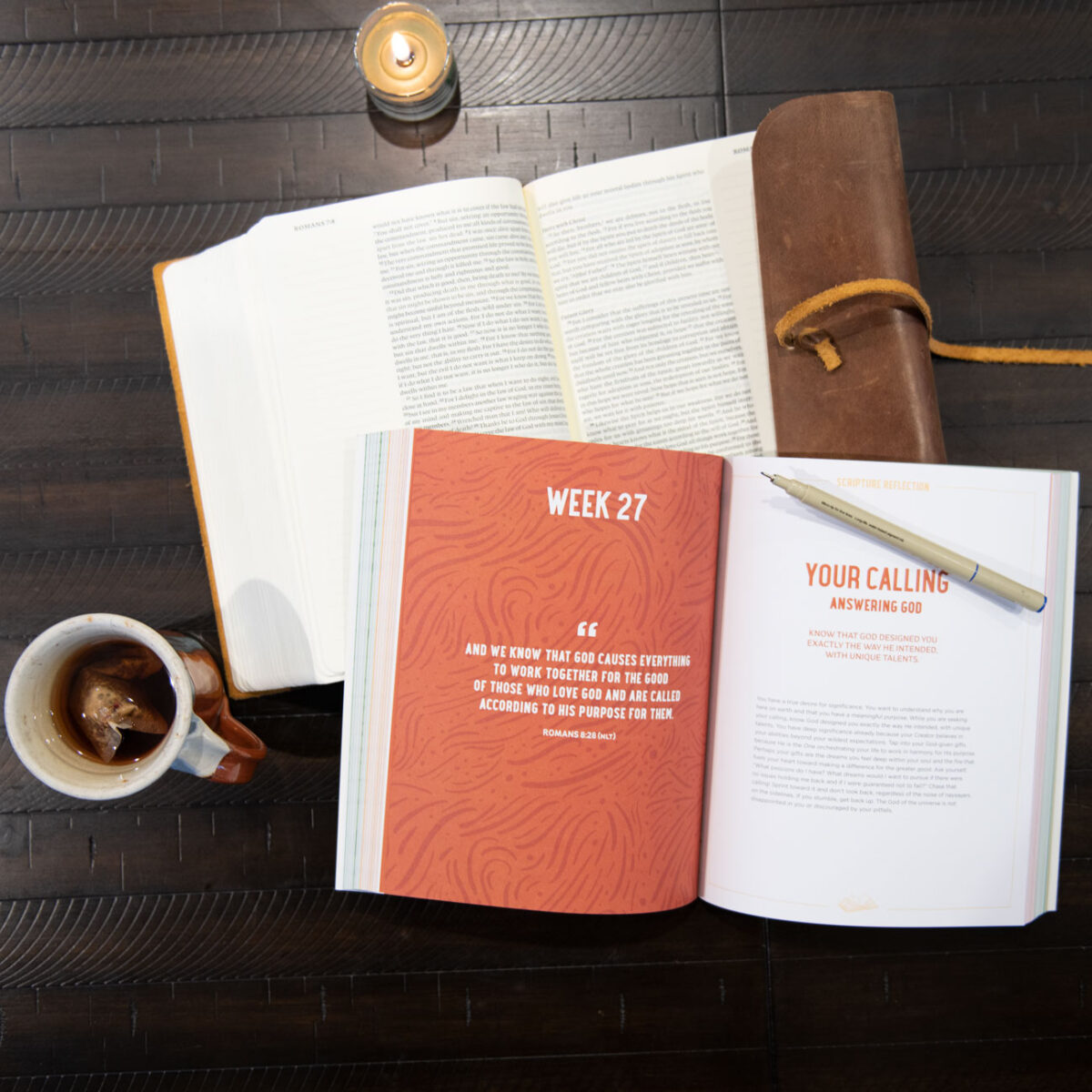Looking At The Enneagram Through A Spiritual Lens: Mark Eaton, Jackie Brewster, & Eve Annunziato
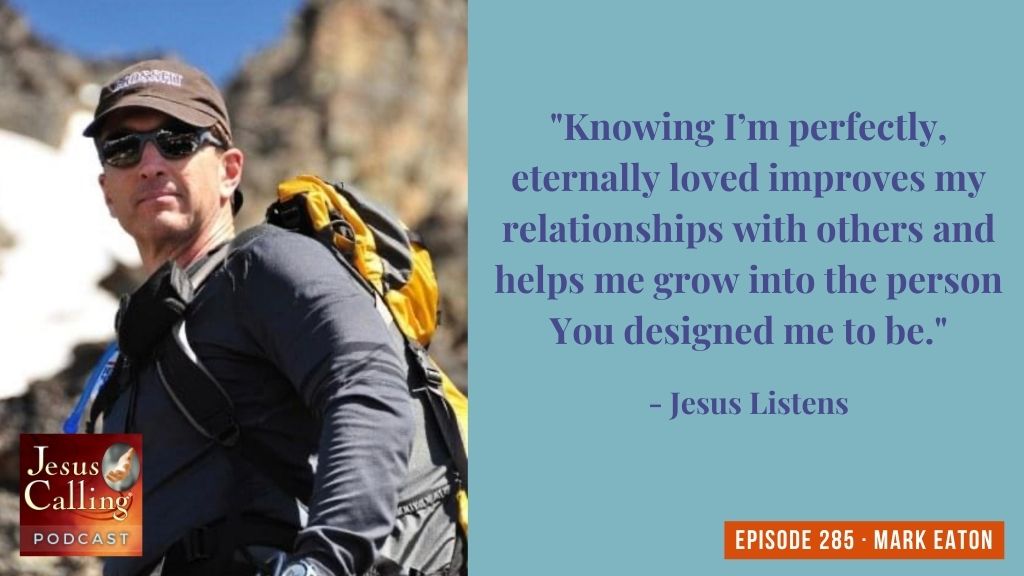
Mark Eaton: We’re created in the image of God, right? And so it’s incredibly complicated, this human condition. In fact, it’s even safe to say that God is infinitely in-understandable. Humans are the same way. We are infinitely complicated, and that’s just a single person. So you put two people together, a couple together, and then add some children in the mix. There’s an algorithm of unlimited infinity in terms of those relationships and all the different dynamics that can happen inside of those. And that’s enough in and of itself to keep us incredibly humble and incredibly dependent on God and the insight that the Holy Spirit can give us.
Looking At The Enneagram Through A Spiritual Lens: Mark Eaton, Jackie Brewster, & Eve Annunziato – Episode #285
Narrator: Welcome to the Jesus Calling Podcast. You might have heard about the popular personality typing assessment called the Enneagram. What you might not know is that the Enneagram has many applications for Christians and has some of its early formation shaped by historical Christian thinkers. By looking at ourselves and those we care about in the context of the 9 Enneagram types, we can understand ourselves and who God created us to be, so that we can in turn better understand others and have a more compassionate heart.
For this episode, we’ll speak with several experts on the Enneagram who help us walk through the different personality types and share deeply personal insights they found from utilizing the Enneagram in their relationships both at home and in their church community.
First up, we’ll speak with pastor and level two accredited Enneagram coach, Mark Eaton. Mark shares how assessment tools like the Enneagram have been used in the church, how it’s helped he and his wife Susie learn to communicate better, and how the Enneagram cuts right to the heart of the matter—our motives and intentions—so that we can examine where our hearts lie.
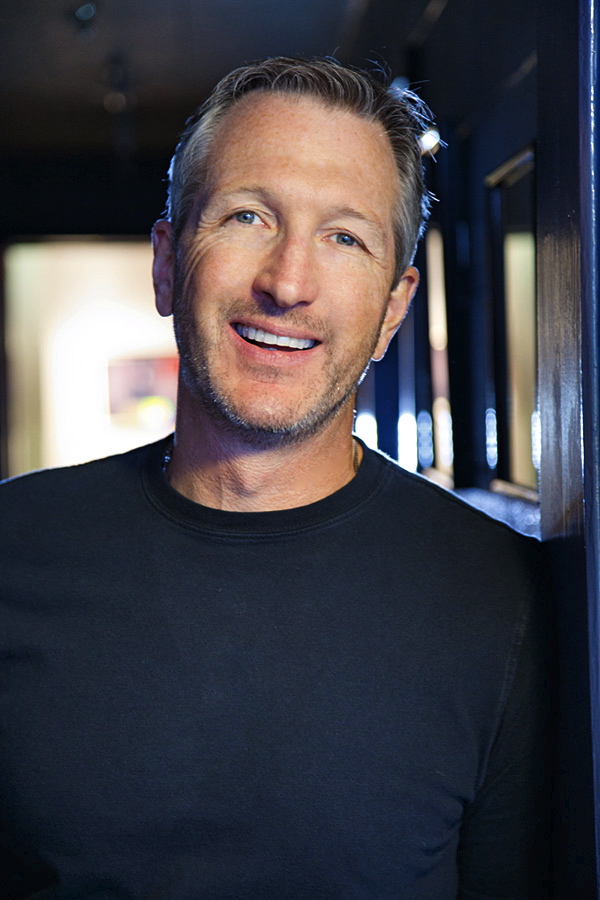
Mark: My name is Mark Eaton. I am a pastor in central Oklahoma. I am also a level two accredited Enneagram coach, and so I get to do a lot of consulting with businesses, proper business vice presidents, and folks at the executive level, as well as business owners who are trying to improve what they do and increase their profit, increase their effectiveness, things like that.
I took a week-long intensive with one of my best friends and one of the finer Christian therapists in the nation. His name is Dr. Harv Powers from the Redimer Group out of Denver. I was talking with him and said, “Harv, I’m doing these assessments for Christian leaders and for corporations. I’ve been doing them for years, and I’m just not really satisfied in the Christian community that we’re really getting to the thing we need now. You know, we fill out applications when we apply for a mission agency or a medical relief agency or maybe a youth ministry or a church position. We fill out an application, the application almost always has sort of narrative types of questions about what your strengths [are], what your weaknesses [are], what do you think that you do really well when you have a struggle? What do you think you need to work on? What are your plans? Those kinds of questions. And although folks try to give something real there, they always tend to be a little bit guarded and we never really get down to the real issue.” And so I asked Harv about a tool, and he said, “You might want to look into the Enneagram.”
So I looked into it, and I actually took an Enneagram assessment. We want to be careful not to use the word test. It’s simply an assessment. And by the way, Christian ministries have used assessment tools ever since my early twenties, we’ve used assessment tools. And so the Enneagram I assessed, and wow, it got to levels of me that I wasn’t aware of. It exposed me if I could say that. In some absolutely fabulous ways, in some absolutely terrifying ways, it exposed me. I looked into it more and more and decided this is going to be the tool I’m going to use with my faith leaders, especially going forward.
The Enneagram studies motives, it studies drivers, it studies what motivates a person. And if we know what motivates us, what drives us, what’s the thing behind the thing, then we can be much more effective in our leadership. Know yourself before you can know others, lead others, motivate others, encourage others, have compassion for others. A leader has to know themselves so they know when they’re actually entering another person’s story or when they’re actually reinforcing their own story, when they’re actually being benevolent and caring, or when they’re only trying to reinforce their own agenda.
“The Enneagram studies motives, it studies drivers, it studies what motivates a person. And if we know what motivates us, what drives us, what’s the thing behind the thing, then we can be much more effective in our leadership.” – Mark Eaton
Leaders, when they know themselves, are much more able to authentically and honestly, without motives, manage supervised care for their staff at much higher levels. And that’s where the Enneagram is different from StrengthsFinder. The Enneagram is much more in-depth, because it studies the level of the heart, studies the drivers and the motives. The bottom line is it makes us incredibly humble people.
It’s really, really hard to read my own profile. For me, it’s exposing, it’s embarrassing. I’m tempted to feel shame, even though I don’t want to feel shame. It’s like, Wow.
Somebody asked me recently if I listen to my own sermons on Sunday or listen to my own messages when I speak at different places. And I said to them, “I should, but it is so hard for me to listen to myself speak.” And then we talked for a minute, and I said to them, “As an act of humility and as an act of compassion for myself, on occasion, I sit down and listen to one of my whole messages, and I try to get past my own sense of shame. I try to give myself the same grace that I would give others.”
I look at myself and the Enneagram in that same way, the Enneagram is really easy compassion for others. Really easy, critical for me. I’m an Enneagram Two, and that’s considered by most Enneagram practitioners as something in the Helper field. Some would say an Enneagram Two is a compassionate servant or considerate helper or something like that.
An Enneagram Two’s View of the World
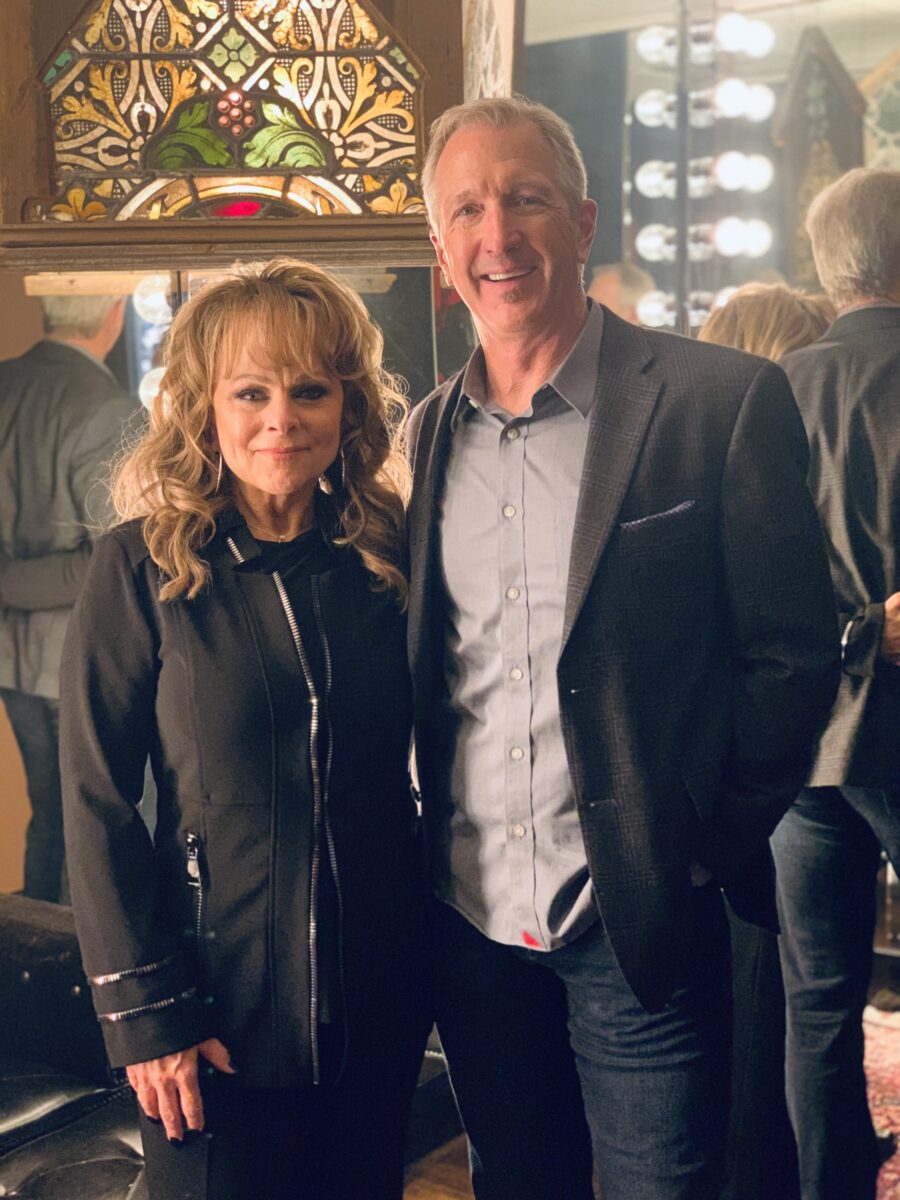
When it comes to being social, as an Enneagram Two, I have to relate to everyone else in the world and they have to relate to me, and I have to figure out how to navigate that world as an Enneagram Two with all the strengths and good and light that an Enneagram Two brings to the room, but with also the shadows and the potential negative things that Enneagram Two brings to the world.
Enneagram Two, Three, and Four are in the Heart space, and we’re in the Image space. So we feel deeply, and we want to look good. We like status. We like attention from other people. We like to be noticed. I like to be noticed for my benevolence. I like to be noticed for my compassion. I like to be noticed for my competency. And I’d like to be appreciated. And in my shadow as a considerate helper, I really do like to help. And there are times when [my wife] Susie and I are washing dishes together, and I might be by the drying rack. And I see that she’s washed her hands. I’ve grabbed the towel, which is off to my right side, I’ve handed it off to her even before she’s shut the water down. An Enneagram Two just seizes those things and gets ahead of the person and sometimes sees what they need before they even are aware that they need it. So she smiles at me once in a while and says, “Enneagram Two” and I go, “Oh yeah, but it’s just a natural thing.”
Enneagram Twos tend to withdraw when we get into a little bit of conflict. We don’t understand our own needs. We understand everybody else’s if you will, but we have trouble getting our own. So I can tend to withdraw sometimes for two or three days before I understand what I’m feeling.
“Enneagram Twos tend to withdraw when we get into a little bit of conflict. We don’t understand our own needs. We understand everybody else’s, if you will, but we have trouble getting our own. So I can tend to withdraw for sometimes for two or three days before I understand what I’m feeling.” – Mark Eaton
We’re created in the image of God, and so it’s incredibly complicated this human condition. In fact, it’s even safe to say that God is infinitely in-understandable. Humans are the same way. We are infinitely complicated, and that’s just a single person. So you put two people together, a couple together, and then add some children in the mix. There are algorithms of unlimited infinity in terms of those relationships and all the different dynamics that can happen inside of those. And that’s enough in and of itself to keep us incredibly humble and incredibly dependent on God and the insight that the Holy Spirit can give us.
The Enneagram has invited me to a deeper level of intimacy with my wife. And for those who have the courage to go there, the Enneagram can help us. It’s just a tool, but it can help us have much more intimate relationships with those who we say we love.
The Enneagram is a tool. It’s an ancient, ancient, ancient tool that has become—perfected is the wrong word, but that has grown over the millennia. Again, it’s just like a tool. I had to cut some trees down the other day and they did not require the Enneagram. They required a chainsaw. So I used a chainsaw. But when I sit with pastors and pastors are saying, “I don’t know why I keep thinking these thoughts, I don’t know why I keep doing this. Why don’t my kids talk to me? Why do I feel so distant from God? Why is my best friend my computer?” And I have these kinds of conversations with these pastors and I say, “Let’s go to the Enneagram, let’s do an assessment, see what it can give us.” It’s been a greater tool for me—other than scripture and other than just compassion and love—it’s been a greater tool than I’ve ever found before because it’s so nimble and practical.
“The Enneagram can help us. It’s just a tool, but it can help us have much more intimate relationships with those who we say we love.” – Mark Eaton
We develop these tools through life that keep us safe. And Jesus says, “He who seeks to save his life will lose it. But he who loses his life for My sake will find it.” Now, the context of that, certainly, is pharisaical living. But it’s very applicable to the things we do.
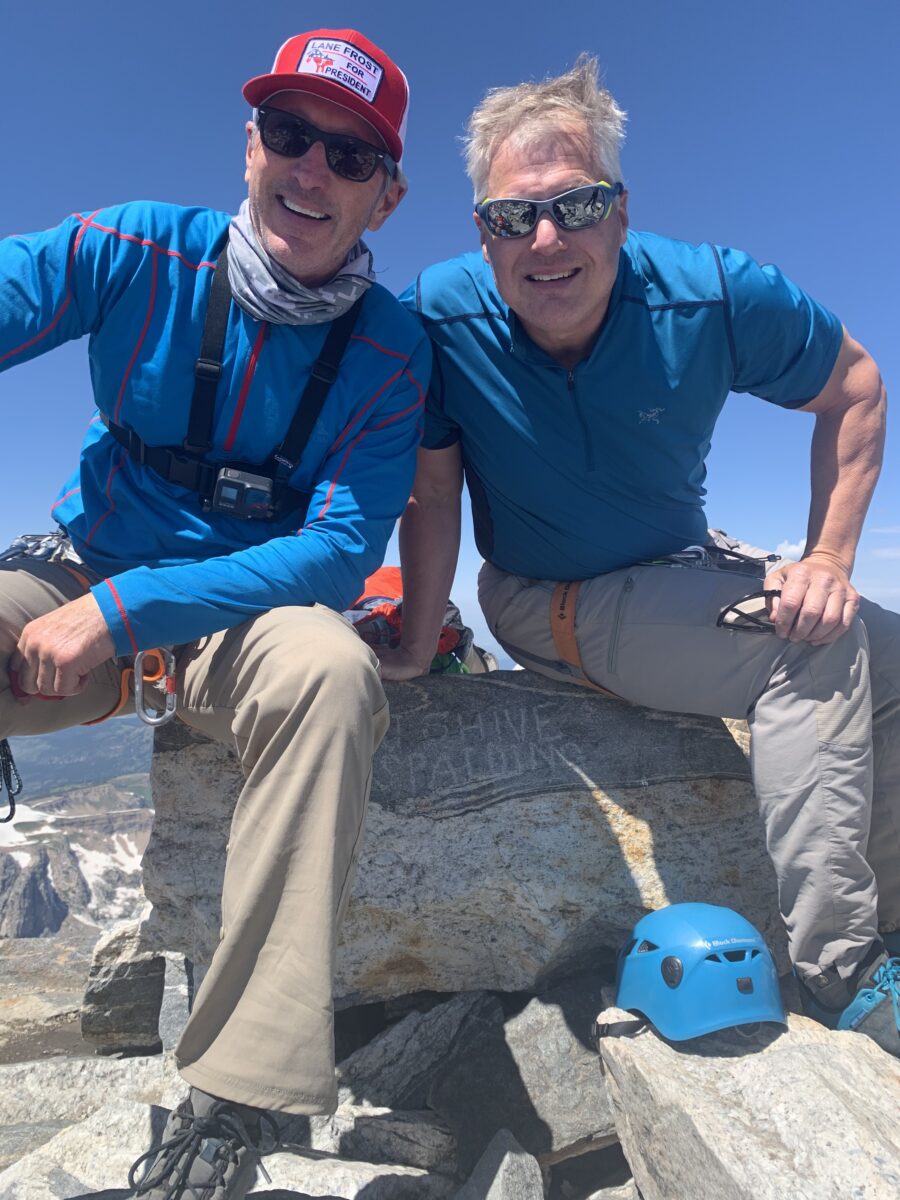
And all the years I spent trying to be cool because that’s where I’m going to make life work if I can just be cool enough if I can just be fit enough, if I can just get the right clothes, life will work for me. My church members will respect me, my elder board will respect me, and I’ll get the things I want. And the Enneagram says, “You’ve got to drop all that if you really want to have life. And I mean the godly life that you were meant to have, you’ve got to drop all that.” And it’s been really good.
Now, the fear is that that we’re going to get pigeonholed, that the Enneagram is going to help us judge people and just give really simple, simple answers to the very complicated human condition and that we can say, “Oh, he’s an Enneagram so and so. That’s why he does these things,” and we can write it off. And that’s just a misuse of scripture. It’s a misuse of wisdom and insight, and it’s a misuse of the Holy Spirit.
I’m thinking of Matthew chapter 7, where we need to look at the log stuck in our own eye. And that’s what the Enneagram really helps us do. It doesn’t say, “Don’t address the splinter in the neighbor’s eye,” just look at the log in our own eye. That’s what the Enneagram is. Help me see, because I’ve got a whole logging truck, and I’ve got about five logging trucks I’m told. There are more logs in my eyes than I can even name. And so that’s where the Enneagram helps me become the humble guy that I really want to be. When I’m facing my wife, I am aware, at least at some level, of the logs in my own eye and maybe, just maybe, I can help someone else with a splinter in their eye.
“The Enneagram helps me become the humble guy that I really want to be. When I’m facing my wife, I am aware, at least at some level, of the logs in my own eye and maybe, just maybe, I can help someone else with a splinter in their eye.” – Mark Eaton
Learning to Pray with Passion
There’s a passion in the Jesus Listens book that I think will stir anybody who really cares to take the time to listen. If someone wants to increase their prayer life but has trouble knowing how to pray, this is almost like the old Benedictine and Jesuit prayer books. It’s passionate, it’s alive, it’s dynamic. And there’s a language in there that really helps me pray in a very personal way. And it’s been super. Thank you so much for making that available to us.
So right now, I’m looking at Jesus Listens and I love this book, by the way, and I went to February 12th, which, like they all do, talks about prayer. But if you don’t mind, just let me read this one passage. It’s pretty special. It says this:
Glorious God,
The Bible tells me You created me in Your own image. Moreover, You made me a little lower than the heavenly beings and crowned me with Glory. So please help me not to doubt my significance. You formed me with an amazing brain that can communicate with You, think rationally, create things, make decisions, and much more. You gave people dominion over the fish of the sea, the birds of the air, and every living thing that moves on the earth. Among all that You have created, only human beings are made in Your image. This is a wonderful privilege and responsibility—making every moment of my life meaningful.
I’ve learned that my chief purpose in life is to glorify You and enjoy You forever. You crowned me with Glory so that I can reflect Your Glory—lighting up this dark world and pointing others to You. Please teach me to enjoy You more and more. I’m grateful that You created me with boundless capacity for delighting in You. I know that the Joy I find in You here and now is just a foretaste of the vast eternal pleasures awaiting me in heaven!
In Your awesome Name, Jesus,
Amen
Narrator: To learn more about Mark Eaton and his work, please visit www.eatonleadership.org.
Stay tuned to hear from Jackie Brewster and Eve Annunziato after a brief message.
If you’re curious how the Enneagram assessment can help you know yourself and engage more meaningfully with others in your life, check out our video series on YouTube called “Relating to God through the Enneagram.” There’s a short video for all nine types, along with a key passage from Jesus Calling specially selected for each type. Led by pastor and Enneagram accredited coach Mark Eaton, these videos also include scripture to inspire you, whichever type you are.
To watch this series, please visit YouTube.com/JesusCallingBook. And, to receive a free study guide for your type that includes Biblical wisdom and Jesus Calling passages specifically geared to each type, visit JesusCalling.com/enneagram.
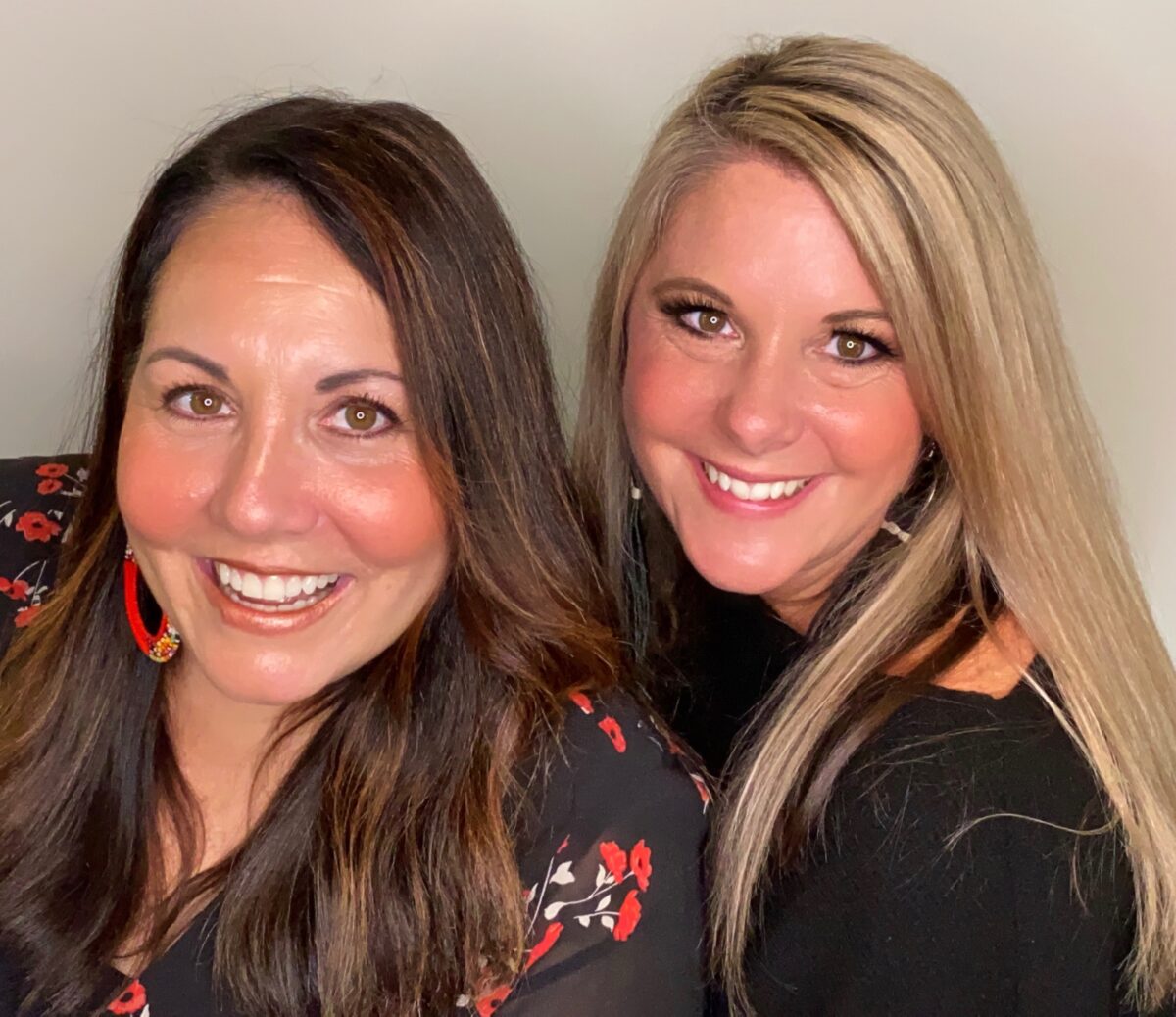
Narrator: Our next guests are Enneagram experts Jackie Brewster and Eve Annunziato.
Eve is an Emmy award-winning journalist who segued from hard news writing and reporting to the role of ministry at several of the fastest-growing churches in the country.
Jackie Brewster is a certified Enneagram coach that lives in Franklin, Tennessee. Jackie focuses on helping people, teams and organizations understand who they are and how to grow toward their health in their personal lives, as well as in their corporate roles through the teachings of the Enneagram and Biblical truths.
Jackie and Eve are friends and wrote their first book together called Hearing God Speak, which guides people to better know themselves and other people while developing a deeper relationship with Christ through the tools of the Enneagram.
Jackie Brewster: My name is Jackie Brewster, and I am a certified Enneagram coach and experiential specialist. I live in Franklin, Tennessee, with my husband, Stephen, and our four children.
Eve Annunziato: I’m Eve Annunziato, originally just a few miles west of West Philadelphia, born and raised. And I kind of consider myself a storyteller and I have been my entire life, and eventually, I traded my hairbrush for an actual microphone. I became a professional storyteller, if you will, sharing others’ stories as a TV reporter. Jackie and I have done ministry together, my goodness, for almost a dozen years, and she’s been one of my besties for a long time.
Jackie: Doing this project together, we worked really closely together and we’ve done a lot of life together before that, so we knew each other. So we both have very strong personalities. I’m an Enneagram Seven with an Eight wing. And Eve is an Eight with the Seven wing. So we both go after life with force, with gusto, with vision, with passion, all the things.
A New Lens Makes a Big Impact
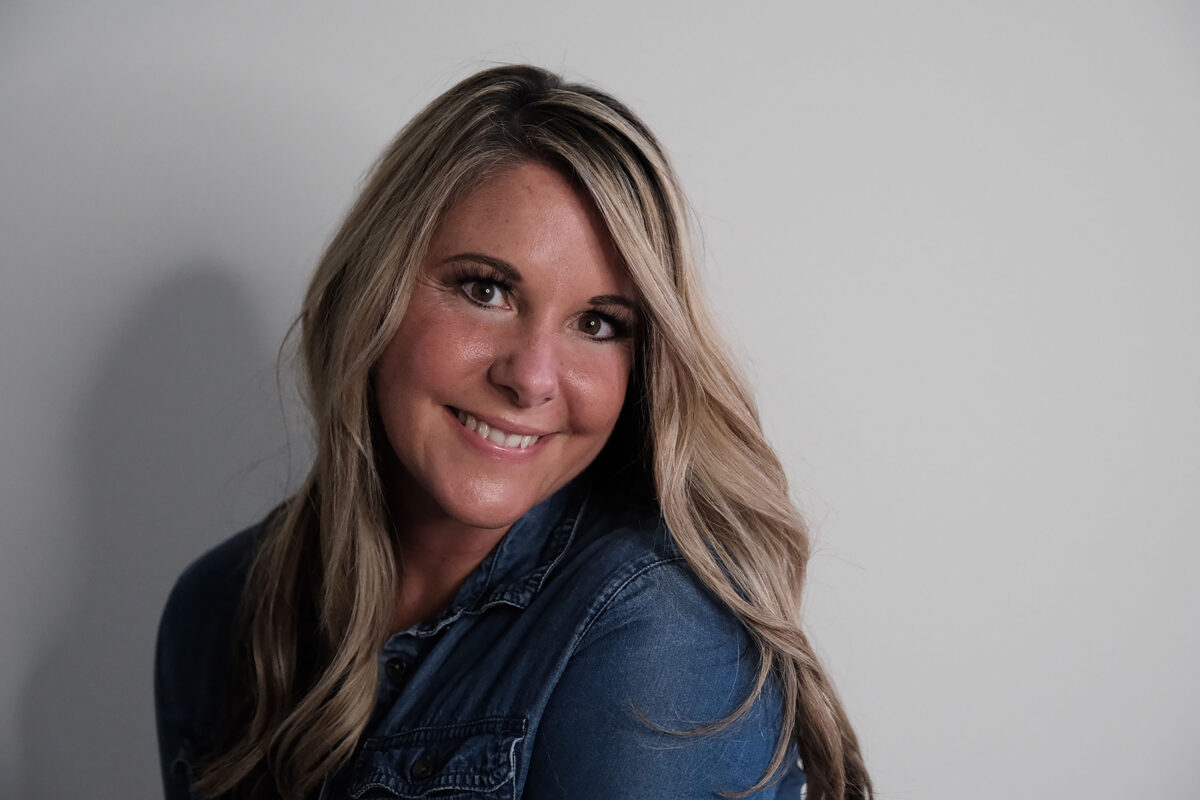
Jackie: The Enneagram came to me through a friend. And as you can imagine for small children, and my husband works in ministry at this time and everything’s really, really busy and crazy and I’m an Enneagram Seven, so I’m like, “We can do all the things, all the fun things! We can go on the walk, we can go to the park, we can do all the things!” I feel like I was completely overwhelmed, overrun. Definitely not living in the healthiest version of myself. I just didn’t even know what that was because I didn’t understand the patterns of behavior.
I had never really looked at my life through the lens of the Enneagram. And so because of the tool that it is, it’s allowed me to really slow down, process what’s happening in my life, take notice of patterns of behavior, ask myself where they’re coming from. And it really has made a huge, huge difference and impact on the way that I function in my marriage with my children and in my business, with my friends, just really understanding what’s happening on the inside of me and owning my own parts of my story, if that makes sense.
“I had never really looked at my life through the lens of the Enneagram. And so because of the tool that it is, it’s allowed me to really slow down, process what’s happening in my life, take notice of patterns of behavior, ask myself where they’re coming from. And it really has made a huge, huge difference.” – Jackie Brewster
Discovering the Enneagram and The 9 Types
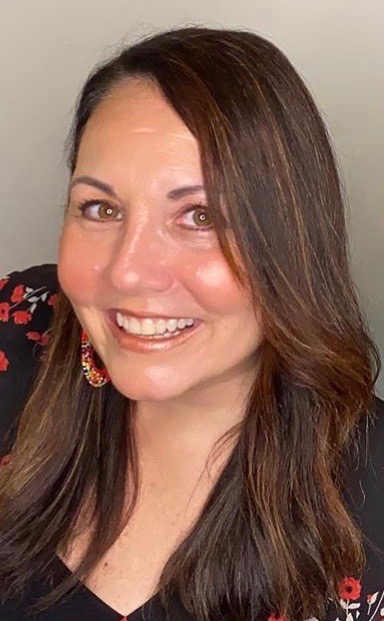
Eve: I actually discovered the Enneagram while going to a bunch of gatherings in Nashville. I feel like, for months, people exchanged the typical question of, “Hey, how are you? What are you doing? What’s going on in your life?” With, “What’s your Enneagram number?” I would routinely answer the popular question, usually with a question such as, “What number do you think I am?”
And by the way, I should probably point out that I’ve since been taught never to answer that question for someone. You can never tell someone their Enneagram number.
But it did pique my curiosity. So I started on this self-discovery journey of, “What’s my number?” And I researched it and I immediately and obviously went to my dear friend Jackie, who I knew as an Enneagram coach, and I was like, “Teach me everything that you know.” And we would be on the sidelines watching our girls play lacrosse, and I would just be drilling Jackie with a lot of questions, and through her grace and compassion, she would answer them all. But it’s really helped me view my life with, I would say, one main theme, and that would be just acceptance. I feel like through the work of the Enneagram, I’m accepting my own personality. And really, most importantly, I’m accepting other people’s personalities that perhaps are different than mine. It’s helped me view my life with compassion and empathy for others and even for myself.
“I feel like through the work of the Enneagram, I’m accepting my own personality. And really, most importantly, I’m accepting other people’s personalities that perhaps are different than mine. It’s helped me view my life with compassion and empathy for others and even for myself.” – Eve Annunziato
Jackie: I’m a Seven, so I’m an enthusiast. I’m an encourager, I’m full of joy. And then I put all these sticky notes all over myself, right? And say, “Well, this is who I am.” That is not the tool of the Enneagram.
The tool of the Enneagram is self-discovery, so it’s saying like, “I am an encourager, where does it come from? I don’t like emotional pain. Why not? I don’t like being trapped in situations. Why not? I have a fear of missing out. Why?” So asking yourself the question, Why? Where did it come from? Why? Why is it true? It’s one of the biggest things that I have my clients ask themselves like, Is it true? And so we take these pieces of ourselves that we’re learning and we’re seeing where we’re uncovering these patterns, and then we use the Bible.
Eve: I challenged the Enneagram and the fact that I was an Eight from the very beginning. I didn’t want to be an Eight. I would retake the test half a dozen times. I did the narrative approach. I asked a lot of questions. Jackie coached me. And then it dawned on me: I realized I was challenging my number, behaving exactly like my formidable Eight.
Now I realize that there is no better or worse or a best number and that our numbers aren’t a problem to be solved. Our numbers are a beauty to be embraced, and that’s helped me warmly welcome my own personality, my own vulnerability. And now, actually, I’m loud and proud of my ‘Eight-ness’ and all of its splendor, which is probably not a huge, huge mistake that my personality is so loud and booming, that I’m loudly proud of my ‘Eight-ness’ and all of its splendor.
So I would have to say that I learned something about myself, and I learned more about the people that I love. And I learned and was reminded that God and His love and His kindness and His generosity and His faithfulness are unwavering.
“I realize that there is no better or worse or best number and that our numbers aren’t a problem to be solved. Our numbers are a beauty to be embraced, and that’s helped me warmly welcome my own personality, my own vulnerability.” – Eve Annunziato
The Enneagram as a Tool to Discover Our Identity in Christ
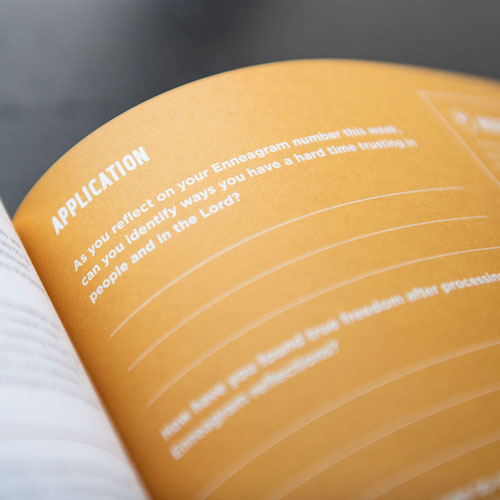
Jackie: When we see these parts of ourselves and we really begin to see areas of our lives that maybe are keeping us from having a deeper, closer relationship with Christ, we can bring it to the Father. And so understanding that picture of who Christ is, He is the Father that wants us to go to Him. So as we recognize different parts of ourselves, He doesn’t want us to try to fix them on our own. He wants us to bring them to Him and ask Him to be in it with us, right? Surrender ourselves to the Lord so that He can go in and He can do the miraculous. He can do the very things that we cannot do on our own. And so I do love using the Enneagram as a tool, but the Bible as a transformation for our lives.
“As we do recognize different parts of ourselves, He doesn’t want us to try to fix them on our own. He wants us to bring them to Him and ask Him to be in it with us…I do love using the Enneagram as a tool, but the Bible as a transformation for our lives.” – Jackie Brewster
Eve: I realized actually there are nine different ways to view the world, none of them are wrong, they’re all equally beautiful. The way that you’ve been created and I’ve been created and the way that we’ve all been created is not a mistake. And there is no such thing as a great personality or a bad personality. We’re all magnificently and purposefully and beautifully hand-designed by, of course, the Creator of everything, right? God of all creation. And I just discerned and I’ve just begun to realize that we’re different, but we’re all equal and we were all made on purpose for His purpose.
I downloaded the Jesus Calling app three years ago, my friend told me about it, and I downloaded it right away. And honestly, these beautiful devotionals have played a very impactful role in my faith journey. These devotionals, for me personally, are just a daily reminder just to start my day, a reminder I serve and worship a God of the universe who loves me. He’s not disappointed in me. A reminder that my God isn’t ruling over me, disappointed in me, up there in the clouds judging every misstep. It’s just such a great reminder that even when I make mistakes, He’s not going to punish me or banish me.
Jackie: I have loved Jesus Calling for years. It was given to, I think, the church staff, Eve, that we were at a long time ago. So it was and is still written in such a practical way that it just felt like, man, it just hits you where you’re at and you can take it and apply it. I love things that are applicable. It’s really important to me to fill my life with the word of God. But then how do I apply the word of God, right, so tools to help me really do that. And then we went on and we got our kids a copy because we want them to hear from God, so Jesus Calling for the kids. It was such a great tool for them to begin to understand God’s word in a really practical way for them.
I’m just reminded through Jesus Calling that He created me who I am and He fights for me, and He’s enthusiastic and passionate about me, and I need to strive and be humble and to be like Jesus. And that’s a very tall order. But it’s those reminders that I’m made on purpose for a purpose that He knitted together and that He’s collected my tears. He has really known every hair on my head. He knows every intimate detail about me, and it’s filling that faith tank that no matter what obstacles I might face that day, I can just remember His truth and His word.
And it’s one of those things that we are just passionate about because we really love to use tools that help us hear God in easy ways, you know, like digestible ways that can transform our lives.
Eve: The God of all creation wants to hear your voice. He wants to speak to you. He wants to build a deep relationship with all of you. And we serve the God of the universe who’s absolutely in full control.
If there’s anything that I learned after 2020 and 2021 is that God is the One in control, and He has your back and we want everyone to know through this process who you are and whose you are. Because at the end of the day, the Jesus message can drown out the lies of the enemy, and we want everyone to find freedom in that acknowledgment that they’re able to understand God better because it’s a gift.
Self-awareness, sure, it can be painful, and it’s been painful for me to maybe learn some of my weaknesses. But actually, if you really think about it, self-awareness is freedom. It’s an ability to give yourself kindness and compassion and then extend that empathy and kindness to others. And we want everyone who goes through this process to love the word of God, to go to it first and foremost, but then to grow in your understanding of your own personality. And so you can process that information, you can learn those patterns of behavior. You can lean into your healthiest version of yourself, all by putting God and His word at the forefront.
Narrator: You can find Jackie and Eve’s new book, Hearing God Speak, everywhere books are sold.
If you’d like to hear more stories about seeing yourself as God sees you, check out our interview with Shannon Bream.

Narrator: Next time on the Jesus Calling Podcast, we speak with flight attendant Taylor Tippett, who shares about her Words from the Window Seat project in which she leaves encouraging and positive notes on the windows of a plane for passengers to find.
Taylor Tippett: Through this project of really keeping an eye out for the small moments and for the kindness, that’s my whole goal with this, it’s just that people would feel understood and loved where they’re at. And hopefully, you know, that the right person finds it and needs it.
